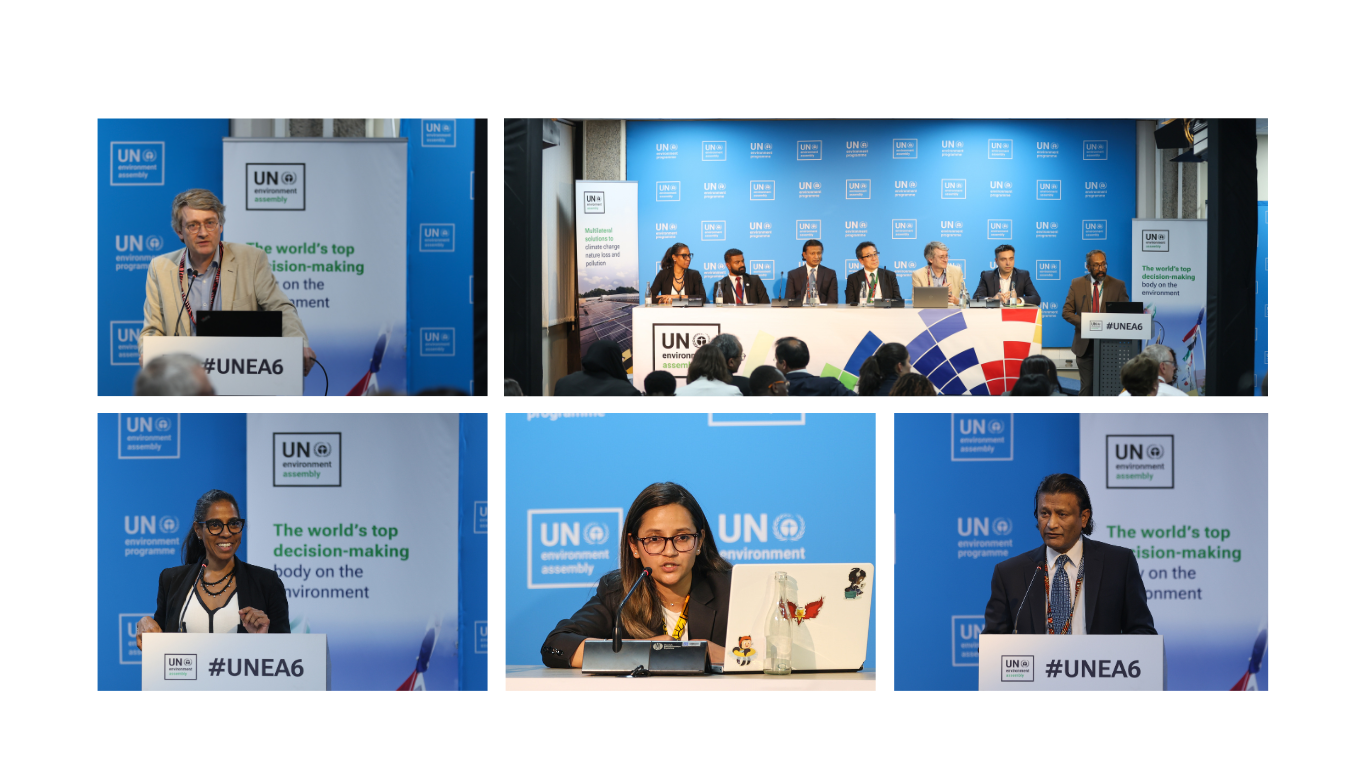
An official Side Event at UNEA-6, 26th February, 2024
A side event focusing on "Making Nitrogen Visible through Sustainable Development Goals" took place during the 6th United Nations Environment Assembly (UNEA-6), organized by the Government of Pakistan. Distinguished speakers included the Ambassador of Pakistan to Kenya, an Additional Secretary from the Ministry of Climate Change & Environmental Coordination, Government of Pakistan, the Deputy Minister for Environment from the Government of Maldives, the Vice Minister for Global Environment and Climate from the Government of Japan, Prof. Mark Sutton, Director of INMS and SANH, Ms. Leticia, Head of Marine and Freshwater at UNEP, Mihai Constantinescu Co-Chair of UNEP Nitrogen Working Group, Mr. David Cooper, Acting Executive Secretary to CBD, Ms. Eirini Ptisilidi, Global Head for International Affairs at Compassion in World Farming, and Dr. Tariq Aziz, Regional Director (South Asia) for International Nitrogen Initiative and University of Agriculture, Faisalabad.
About 60 delegates and representatives of various global organizations participated in the event, and shared their experiences during the event and reception, with great enthusiasm and showed their cooperation to address this global challenge. More than 150 people attended this event through Zoom link.
Mr. Iftikhar-ul-Hassan Sha Gilani chaired the event as Chief Guest, and discussed the objectives of the event and priorities on Sustainable Nitrogen Management by Pakistan. He warmly welcomed the distinguished guests, Ministers, delegates and audience to the event, and also paid special appreciation to the Government of Japan and Government of the Maldives for accepting the invitation to this event, and their overwhelming support. Vice Minister (Govt of Japan) and Deputy Minister (Govt of Maldives) gave the statements on Sustainable Nitrogen Management and discussed the ongoing activities and national action plans to improve N use efficiency and addressing the N pollution challenge. He showed great concern that Pakistan, despite contributing less than 1% to global greenhouse gas emissions, faces significant climate change impacts, including floods, heatwaves, and air pollution. Nitrogen emissions have risen over the past four decades, correlating with increased agricultural use, urbanization, energy demand, and transportation. The Government of Pakistan is actively promoting sustainable practices to mitigate these impacts. We plan to submit the resolution in UNEA-7, and look forward to the co-sponsors for this cause.
The brief deliberations (by Mark Sutton, Tariq Aziz, Mihai Constantinescu, David Cooper, Eirini Ptisilidi, and Bigyapti Nepal) are as follows.
Nitrogen, crucial for life on Earth, has seen significant alterations to its cycle due to human activities. This has led to increased nitrogen release into the air and water, causing degradation of soil, air, and water quality, biodiversity loss, and climate change. Nitrogen pollution has surpassed planetary sustainability boundaries, highlighting the urgent need for action on sustainable nitrogen management to achieve the 2030 agenda. The relevance of N within the perspectives of the SDGs reinforces the need to develop an integrated approach to improve the efficiency of Nr use. Examples include technological innovations, socioeconomic concerns, political interventions, and behavioral changes. Integrating the multiple benefits and threats of humans' impact on the nitrogen cycle is essential to maximize synergies, minimize trade-offs and develop a shared gravity to mobilize transformative change. A shared strategic approach is needed, where fragmented intergovernmental action is brought together and catalysed with appropriate investment, especially given the value of wasted nitrogen resources, worth around US$ 300-600 billion at 2022-2023 prices. The establishment of a sustained intergovernmental process on nitrogen would help mobilize change, while stimulating engagement by multi-actor partnerships and others. Annual savings of US$ 100s billions from reducing wasted nitrogen resources fully justify the modest costs of such an intergovernmental mechanism.
Despite being integral to sustainable development goals, nitrogen remains invisible in many indicators. The event emphasized the necessity of making nitrogen management a visible priority to accelerate action. Global assessments reveal imbalanced and inefficient nitrogen use, particularly in agricultural systems, with increasing losses observed in underdeveloped and developing countries. The South Asia region has shown commitment through initiatives such as the Columbo Declaration, aiming to halve nitrogen waste by 2030, and two resolutions 4/14 and 5/2 adapted at UNEA-4 and UNEA-5, respectively.
Collaborative efforts are crucial for effective nitrogen management. The event called for a new resolution on Sustainable Nitrogen Management (SNM) focusing on establishment of intergovernmental coordination mechanisms, sharing of experiences, and development of national action plans. Financial support mechanisms and capacity building are vital, especially for developing countries, to implement action plans and report back to UNEP. Mobilizing action on the global nitrogen challenge will depend on leadership by key countries to champion the necessary actions.
Mainstreaming nitrogen management into development strategies can unlock synergies across Sustainable Development Goals, promoting food security, clean water, air, ecosystem protection, and climate change mitigation. The establishment of a Nitro-Finance mechanism was also proposed to mobilize investment towards reducing nitrogen waste and recovering existing resources. A global halving of nitrogen waste is, in principle, feasible by 2030 through innovation in ambitious technical and non-technical measures. However, with insufficient urgency, this ambition is likely to be missed, especially given investment timescales, competing priorities and increasing global human population. Actions to moderate excessive Nr food intake and population increase require more attention, as do efforts to ensure that current developments in ammonia fuel do not exacerbate nitrogen pollution risks.
Sharing information and best practices, capacity building, and addressing financial barriers are essential for accelerating progress in nitrogen management. Leveraging existing platforms and networks for knowledge exchange is critical, particularly for developing countries. Innovative financing mechanisms, including Nitro-Finance, should be explored to support implementation efforts globally.

